- Home
- Joy Dettman
Mallawindy Page 7
Mallawindy Read online
Page 7
Both Johnny and Annie took after Jack’s side, where Ben was pure Vevers. It had taken a long time for the blood of the two families to mix, but mix they had in Bronwyn, a wild urchin. At seven, she was an odd little mixture.
‘Poor Jack,’ she said, only realising she had spoken her thoughts aloud when her children turned to her. ‘Just thinking out loud, loves,’ she explained. ‘Just thinking how much Annie is like her Dad, like he was that first time I saw him. Prince Charming on an old pushbike.’
But Ann was on her feet, her chair fallen over, her eyes angry as her hands signed, close to her mother’s eyes. ‘No! Not like him. You said like you. Yes, I am like you. Not like him. I will not be like him.’
‘Shush, love. Shush.’ Ellie’s hands reached out to still the flying fingers. ‘Let me just listen to the night. Do you know what it sounds like to me? Like a tired old boxer, waiting in his corner for the bell to ring for the next round.’
Two days later Jack arrived home on the midday bus. He had to walk from town and he was hot and sore. He dodged around the dog, who sniffed at his shoes, recalling with difficulty the scent of this man.
‘Shit!’ he screamed, stubbing his perennial corn on the splaying metal foot of the sewing machine. He hopped and he cursed and he tossed a basket of laundry into the yard. ‘Shit on this bloody taxiless hole.’ He pulled his shoe from his foot. It followed the laundry basket into the yard.
‘Jack! For goodness sake. You’ve just got in the door, love.’
It was enough. Any excuse would have been enough. Tossed from the car like so much garbage. Cops treating him like shit. Stuck in a ward with the dregs of humanity and fed on hospital slops, and now he was back in this shit hole with her kids and her whining bloody voice. ‘The bloody mongrel should have been put down. He’s dead on his bloody feet.’ He limped into the kitchen.
‘Sit down, love, and I’ll get you a Bandaid.’
‘It’s a wonder you haven’t got corns on your guts. Why haven’t you got the gumption to tell me to go to buggery?’
‘Don’t be silly, Jack. We were married in the church, and it’s lovely to have you home.’ She lied, and he knew she lied.
‘Dishonest bitch. You wish I’d died. Freed you from your vows. Come on. Say it. Tell me to piss off. Tell me to go. Just say it. Say piss off you bad bastard. Get out of my life, and stay out of it. It’s what I want to hear. Say it.’
‘I didn’t know if you were alive or dead for twelve months, Jack. What do you think that did to me and your children?’
‘Made you all bloody happy for a while. Tell me to go. I want you to tell me to go.’
‘You should have contacted us, let us know you were all right.’
‘As if you cared, you gutless crawling bitch, with your little blameless face and your cold bloody bed.’ His voice was tired, bored already. He needed a drink – or her.
‘Not in front of the children, Jack.’
‘Not in front of the children, Jack,’ he mimicked. ‘Why not? Let them know you keep a bloody cold bed, or did your tame copper warm it up while I was gone?’
‘Bob has been a good friend to me, and that’s all.’
‘Then your tongue must be hanging out for it. Get down on the floor and play dead.’ His right hand reached for her, black stitches half-circling his wrist like a many-legged caterpillar, but Ellie was out the door and heading for the river.
Jack stood in the centre of the room, his eyes filling with tears. He had a block of chocolate in his pocket for her. Fruit and nut. He’d thought there would be someone in town to drive him home. He didn’t want to walk home, fall over the mongrel dog and kick his bloody corn. He didn’t. ‘Come back!’ he screamed. ‘Come back to me. Come back here.’
Empty house. Empty. Only a cake left to burn in the oven, only pots left to boil dry on the stove. Only the kettle spitting its ire at him, and the dog sniffing at his feet. He took a small bottle of whisky from one pocket and the melted block of chocolate from another, and he sipped his whisky, and he fed the chocolate to the dog.
‘King Jack of Chook-Shit County,’ he said, ‘and you, you crippled bastard, my only loyal subject.’
Unannounced, Ellie and her dripping entourage entered Bessy’s back door. No need for questions, nor answers. The trail of water told its own story. Bessy reached for towels first, and telephone second.
A gunshot blast cut her dialling short. It echoed and re-echoed along the river, then a long unnatural silence followed. Birds were silenced. The room was silenced. ‘With a bit of luck he’s shot his bloody self,’ Bessy commented. She hung up the phone. ‘Get your clothes off and toss them in the drier.’
They stayed at Bessy’s house, wearing borrowed clothes, they stayed until the sun went down, and God took to the heavens with his paint-box. They stayed on, listening to the night birds across the river, mourning Jack’s return. They stayed until their clothes were dry and Ellie’s cows lowed out their message of discomfort, until the hens went to their roosts unfed. They stayed until Ellie could stay away no longer. No worthy beast should suffer because of her choice of husband.
‘I’ll tell him to go tomorrow, Bessy. I’ll tell him it would be better for both of us to have a separation. I will.’
She left Bronwyn on the safe side of the river, and the workers rowed home in Bessy’s boat. They went about their business by torchlight and moonlight, seeking Jack behind every shrub. They milked the cows, afraid the hissing machines might wake the sleeper. They fed the pigs, tossed wheat for the hens to find come morning. Ann broke eggs for the dog, mixed them with milk, then they looked for him in all his favourite places.
He was under the plum tree, and he didn’t stir. Ellie reached down to pat him and her hand touched fur that was sticky, stiffening with blood. She stood in the yard and howled at the moon. Ben ran. He was too old to be seen crying.
Ann didn’t cry. She stalked the fence, the yard, backwards and forwards, her eyes never turning away from the house and the murderer within the house. She walked, and her mother wept, and Ben stayed away for a long, long time.
The moon was low, a heavy gold, the night was bright with light. Strange light tonight. Ann took up the pick, walked with it to the willow where she dug at the clay, each slice of the pick cutting into her father’s skull. The hole was a foot deep before Ben crept to her side with a shovel. They worked together then, knowing without need of words when it was done. Together they lifted the dog onto a bag, and carried him on his stretcher to the grave.
Ben’s tears ran again. He let them trickle down his nose, drip from the point of his chin. Soundless tears of impotent rage, they gripped his throat, crushed his chest. This land had become his land. He wanted it, and the freedom he’d possessed last week, last year, to make it the way he wanted it. Now it was over. Now the old days were back again, the tiptoeing around his father, the attempts to divert his anger, the gauging of his mood before each word was spoken. He wanted to run like Johnny. But he couldn’t run. He had to build his bridge. He had to stay here and scuttle around his father – a mouse in a trap. He wiped at his nose with the back of his hand, licked salt tears from his lips as Ann kneeled over the dog, stroking the soft fur between its eyes. She was humming a tuneless lullaby, a primitive keening of the dead. She rarely made a murmur. It sounded strange, but somehow fitting.
‘What’s she doing? Is she crying, Benjie?’
‘I don’t know, Mum.’
‘She’ll bring him out here with that noise,’ Ellie sobbed.
‘Leave her alone. She’s ... she’s just ... just singing him to sleep, I think.’
Then, as suddenly as it had started, the keening ended, and Ann ran for the laundry, returning with an old sheet. They wrapped Mickey well; they tucked him into his final bed, and it was done.
‘We’ll have to go, loves. We’ll sleep at Bessy’s tonight. I’ll tell him to leave tomorrow. I’ll get Bob to come down and – ’
‘You go,’ Ann signed as she walked to the ove
rgrown plum tree and began stripping the green fruit from its limbs, dropping them down the front of her frock.
‘Tell her they’ll give her a belly ache. They’re too green.’
‘Go,’ Ann signed again. ‘Go. Run away.’ She walked towards the house tossing plums at the bedroom roof.
‘Annie! For the love of God, what are you doing? Annie! Stop that!’
Green plums, raining on the iron roof, thundered like giant hailstones, while Ann screamed, screamed, until he came, then she tossed her plums at him.
Through the chicken-wire gate, across the paddock to the river’s bend she led him, Ben behind them, jumping stumps, skirting clumps of timber, adding his own scream to the night.
‘Swim, Annie! Swim!’
But Ann had stopped dead at the river bank. Her father braked, almost fell on her. She tossed her last handful of plums in his face, and laughed at him.
No sound. No movement. A night fly settled on a gum leaf, creating thunder. Somewhere in another dimension of time a leather belt whirred in the warm night air, guided by a master’s hand. Whirr, thwak! whirr, thwak! Too clear, crystal clear.
Bessy was screaming abuse from the opposite side of the river.
Whirr, thwak! Whirr, thwak! Whirr, thwak! Only that and Ann’s laughter, old as her eyes that had stared too long, old as memory, old as time.
Ben, immobile figure carved from stone, howled for his lack of height, of breadth, for his inadequacy, while the belt whistled in the air, thunked on flesh. ‘I’ll break you yet. I’ll break you, you crazy bitch,’ Jack screamed.
He didn’t know he was wearing himself out on a lost looking-glass.
Ann could feel the belt as if it were landing on glass, see the shimmer of glass. She was the girl dressed in blue, laughing behind the looking-glass. And she could hear the words, hollow words.
‘Break you. Break you.’
Only diamonds can cut glass.
Her laugh and the words mingling. She couldn’t stop the words, or her laughter. Didn’t want to. Laughter cut him more deeply than his belt could cut her.
You’re just a reflection, an opaque rejection, you won’t pass inspection.
‘You’re mad, you black-headed little bitch. I’ll kill it in you.’
She heard those words, too. And she laughed louder because she heard them. He gave up before she did. He ran from her laughter, and she lay on the sand laughing and counting the silver stars circling in the sky. Strange sky. Strange light tonight. Everything looked strange. Crystal clear. The world was a flea beneath a magnifying glass. She could see every dust speck, every hair.
Ben squatted beside her, his eyes brimming with tears, and she watched one lone teardrop glistening like a diamond beneath the light of the grieving moon. It moved too slowly. She watched it, until it moved not at all. ‘Are you all right, Annie? Talk to me.’
Dear Ben, of so few words, now needed her words. They were there, too, and she knew it, but they were too hard to find yet.
‘Stop it, Annie. Stop laughing. You’re frightening me,’ he pleaded, carefully straightening her skirt, modestly covering her pants and bleeding thigh, all the while weeping. An excess of tears, diamonds to spare.
Ann reached up her hand to make him some words, but her index finger found Ben’s diamonds and she stole one for her own eye, placing it carefully there, trying to blink it into the place that made the salty water flow.
‘One tear,’ her hands said. ‘Annie Blue Dress, only find one borrowed tear for our Mickey.’
the test
December 1973
Dear Mr Fletcher,
Ann will not be attending school today, due to a sore throat.
Yours faithfully,
Mrs J W Burton.
Ellie didn’t like writing lies; the sore throat eased her conscience. She’d slept in Jack’s bed last night, and they’d made up. He’d said he was sorry. He’d been gentle, like he used to be and she’d been feeling very hopeful, until she saw Annie.
‘No school today.’ Eyes down, Ellie pushed the note across the table, attempting not to see what Ann’s wild hair did little to camouflage. She was marked from throat to calf. Thank God he hadn’t marked her face. Ellie looked at the skirt hem, hurriedly lengthened. ‘Note. Bronwyn will take it to school. You stay home today.’
‘I wear high neck cardigan. Pull sock high,’ Ann signed and mimed.
Ellie shook her head. ‘Write it down for goodness sake.’
Ann gritted her teeth, tossed her hair back and went to the door, signalling Bronwyn to her side. ‘Tell her I wear cardigan. Pull sock up high.’
‘Tell her she can’t go out of the house like that, Bronwyn. I’ve written a note to Mr Fletcher.’
‘Tell her, so sorry she waste good paper on note. I must go today. Stupid priest, long nose in everything. Now got Daree high school headmaster big frightened. Don’t want dumb girl. Think dumb mean stupid. Must do test. Must do good, Mr Fletcher say.’
Backwards and forwards the argument continued, Bronwyn translating as easily as Ben, and like him, adding her own comments. ‘She has to go today, Mum. Old Fletch said so.’ Again the hands flew. ‘A big nose from Sydney is coming to see how dumb she is – to see if she has to go to the deaf school again.’
‘She can’t leave the house looking like that. Tell her she’ll be the death of me with her wilful ways. She always did bring the worst out in her father. He was asleep. He would have been all right if she’d left him to sleep it off. Tell her she’s getting too big for her boots, lately.’
‘Tell her sorry. Better buy bigger boots for Annie. I will not be same like her. Last night, she very strong lady, say, “Yes, I tell him must go. We not want him here.” Today she say, “Yes Jack, No Jack, three bag full Jack”.’ Ann thumped the table with a closed fist and the cups jumped high. ‘He kill my dog. I hate him. I want him go away.’
‘Tell her we would have had to have Mickey put down soon. He was fourteen.’
‘Tell her, I don’t care. Maybe he live seventeen year. Maybe twenty. Yesterday, she person. Like Bessy. Like my mother. Today she got ant brain. Got worm heart back.’ Ann pivoted on her heel, and left the room, leaving her small translator giggling.
‘Annie! You come back here at once! Annie!’
Bronwyn shook her head. ‘She’s going to go, Mum, and we’re late already. You know it’s no good yelling.’
Ann’s acceptance at the Daree High School was important to Mr Fletcher. She wouldn’t let him down. The Burton girls arrived in the school yard in time to join the march into classroom. Bronwyn joined the tail end of Mrs Macy’s group. Ann marched behind Marlene Dooley, her seat mate. She was older by ten months than Marlene, and a foot taller, taller than most of the boys. Yesterday it hadn’t mattered. Today she was conscious of her height.
She slid down to her seat, stealing a glance at a seated stranger. He was as thin as Malcolm Fletcher was fat, his pinched features non-giving, like shoes saved for church and funerals. His rat-eyes stared at the dark faces scattered amongst the white.
Mr Fletcher looked uncommonly dry. His well loved Thermos wasn’t on the table.
‘Would you like me to light the fire, Burton?’ he snarled. ‘Go to the cloak room and remove that sweater.’ Her cardigan today was like a red rag waved at a sweating bull.
‘Sore throat.’ Ann signed. ‘Mum say, must keep warm.’
The inspector sniffed twice, a habit he repeated every minute, on the minute. Too mean to give up bodily fluids, he sniffed as he handed the test paper to the sixth graders. He sniffed as he stopped beside Ann’s desk. She looked up, caught an eye that skidded away like fat on a hot trypan. He sniffed again, and sat, made a note in his black book.
‘Time,’ Malcolm bawled at a quarter to twelve. ‘Scoot. Go run your heads under a tap and clear the brains. Scat, and allow me to clear mine. And get that confounded sweater off your back before you re-enter my classroom, Burton. The temperature is forty in the shade and ten more in here.’ H
e waddled across the playing field to his house, faster than he had moved in many a day, his lips moistened in anticipation.
Ann had no cut lunch. She could have borrowed a sandwich from Bronwyn or Marlene, instead she spent the hour in the tiny cubby hole library, looking up words in the dictionary.
Malcolm and the stranger returned together to the classroom. They ignored her.
‘To continue educating her within the normal school system would be detrimental to her well-being. My report will be to that effect, Mr Fletcher.’
‘Look at the girl. She reads that dictionary as some read the Bible.’
‘My argument is not with her ability to handle the work. I speak of her psychological well-being. Is she out in the playing field with the others? No. She will be better off with her own kind. I’d also like to discuss your handling of the Aboriginal students. You must find the parents of the white – ’
‘The Burton child is my primary concern at this time. To place her in an institution, at this stage of her development, would be criminal.’
‘You have heard my opinion, Mr Fletcher. Now, the Aboriginal problem. Whites sit with whites, the blacks sit with other blacks,’ and he sniffed. The droplet was saved.
‘I have no Aboriginal problem. In my school, students sit where I sit them. They like it or lump it,’ the fat man snapped. ‘To get back to the Burton child.’
‘The subject is closed, Mr Fletcher. I can only agree with the departmental heads on this matter.’
‘Brain like a steel trap. You’re incapable of seeing the obvious. The girl’s lip-reading skills are outstanding. Too outstanding. We make few allowances for her. Her classmates understand her. They will be with her next year. You are treading on dangerous ground recommending she be sent away from her family again. I explained in my report her response when she was placed in a school for the deaf some years ago. You did read the report, I assume.’

 The Hope Flower
The Hope Flower Trails in the Dust
Trails in the Dust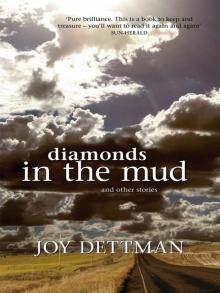 Diamonds in the Mud and Other Stories
Diamonds in the Mud and Other Stories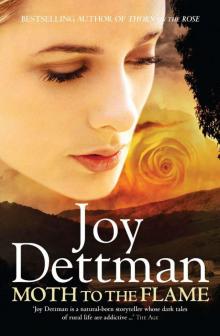 Moth to the Flame
Moth to the Flame The Tying of Threads
The Tying of Threads Wind in the Wires
Wind in the Wires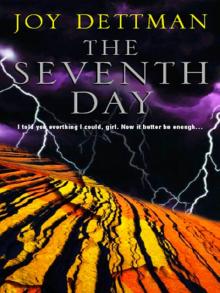 The Seventh Day
The Seventh Day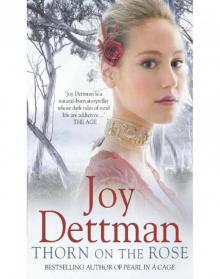 Thorn on the Rose
Thorn on the Rose Jacaranda Blue
Jacaranda Blue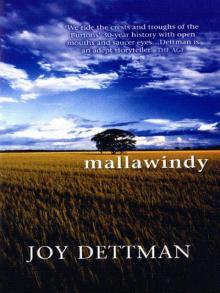 Mallawindy
Mallawindy Ripples on a Pond
Ripples on a Pond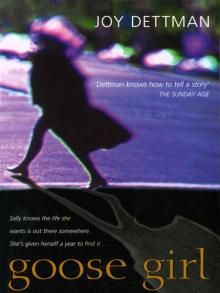 Goose Girl
Goose Girl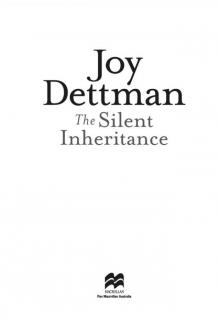 The Silent Inheritance
The Silent Inheritance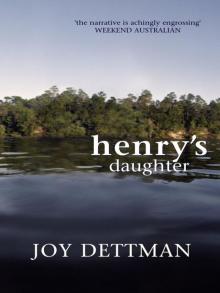 Henry’s Daughter
Henry’s Daughter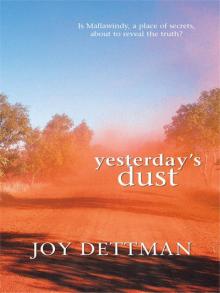 Yesterday's Dust
Yesterday's Dust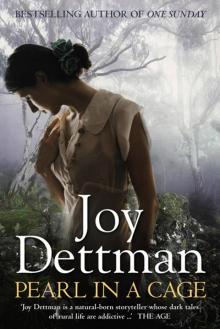 Pearl in a Cage
Pearl in a Cage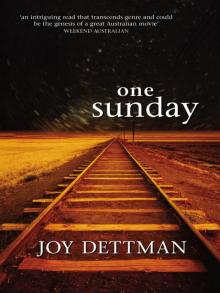 One Sunday
One Sunday